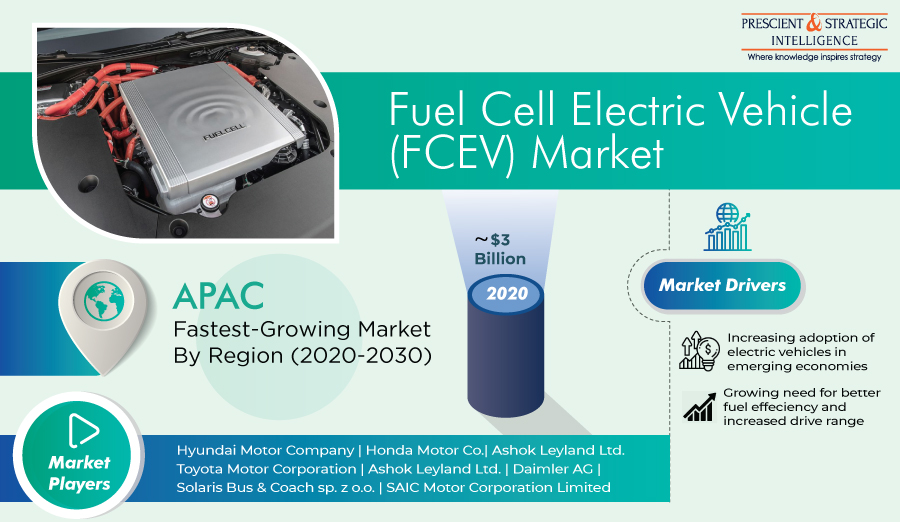The European Union (EU) implemented the Regulation (EU) 2019/631 on 1 January 2020 to set EU fleet-wide carbon dioxide CO2 emission targets to be applied from 2020, 2025, and 2030 and provide a mechanism to incentivize the uptake of zero- and low-emission vehicles (ZLEVs). Similarly, the Government of Canada encourages the uptake of new energy vehicles through its nationwide Zero Emission Vehicle Strategy. Implementation of such stringent vehicular emission standards and extensive focus of governments on deploying fuel-efficient vehicles are encouraging the adoption of environment-friendly automobiles, such as fuel cell electric vehicles (FCEVs) worldwide.
Additionally, the burgeoning demand for increased driving range and improved vehicle performance will strengthen the fuel cell electric vehicle market during 2021–2030. According to P&S Intelligence, the market generated around $3 billion revenue in 2020. Over the last few years, FCEVs have gained popularity due to their longer range, shorter refueling time, and improved performance. In addition, these automobiles also offer superior power and higher torque and emit a lesser amount of CO2 and greenhouse gases (GHGs) than conventional vehicles.
Request for sample pages of this report: https://www.psmarketresearch.com/market-analysis/fuel-cell-electric-vehicle-market/report-sample
In the recent past, a larger number of passenger FCEVs were adopted, as compared to the commercial variants, due to the surging demand for clean personal mobility, soaring per capita income in emerging economies, and increasing implementation of tough government norms to mitigate vehicular pollution. Moreover, the mounting focus of taxi and cab fleet owners on inducting new energy vehicles in their fleet also facilitated the sales of passenger vehicles globally. Both passenger and commercial vehicles are powered by phosphoric acid fuel cells (PAFCs) or polymer electrolyte membrane fuel cells (PEMFCs).
Prominent manufacturers of PAFC and PEMFC powered passenger and commercial vehicles are Honda Motor Co., SAIC Motor Corporation Limited, Tata Motors Limited, Hyundai Motor Company, Solaris Bus & Coach sp. z o.o., Toyota Motor Corporation, Nikola Corporation, and Daimler AG. FCEVs offered by these companies are available in long as well as short range. In the upcoming years, an enormous number of short-range FCEVs will be purchased due to the booming demand for low-emission vehicles for commuting short distances and surging use of such vehicles for delivering goods by e-commerce companies and airport and port authorities.
In recent years, FCEV manufacturers have been partnering and collaborating with other automotive original equipment manufacturers (OEMs) to reach out to more populace. For instance, in April 2020, Daimler AG and Volvo Group formed a joint venture worth $1.3-billion to offer hydrogen-fuel-powered commercial vehicles in the foreseeable future. Likewise, in June 2020, Toyota Motor Corporation formed a joint venture, named United Fuel Cell System R&D, with Guangzhou Auto, Beijing SinoHytec Co., Dongfeng Motor Corp., Beijing Automobile Group Co., and China FAW Corp. to develop fuel cells.
Browse detailed report on Global Fuel Cell Electric Vehicle Market Trends, Segment Analysis and Forecast to 2030
In the coming years, the Asia-Pacific (APAC) fuel cell electric vehicle market will exhibit the highest growth rate due to the presence of stringent vehicular emission norms in the region. Additionally, the existence of leading FCEV manufacturers, such as SAIC Motor Corporation Limited, Toyota Motor Corporation, and Hyundai Motor Company, also facilitates the adoption of such new energy vehicles in the region. Furthermore, hefty investments being made in the development of hydrogen fuel cell vehicles are also encouraging the people of APAC to shift toward such energy-efficient vehicles.
Therefore, the implementation of stringent government regulations for reducing CO2 emissions and encouraging the adoption of ZLEVs and the soaring need for vehicles with improved performance and longer driving range will encourage the usage of FCEVs in the forthcoming years.
Fuel Cell Electric Vehicle Market Size Breakdown by Segments
By Type
- Polymer Electrolyte Membrane Fuel Cell
- Phosphoric Acid Fuel Cell
- Others
By Range
- Short
- Long
By Vehicle Type
- Passenger Vehicle
- Commercial Vehicle
By Region
- North America Fuel Cell Electric Vehicle Market
- By type
- By range
- By vehicle type
- By country – U.S. and Canada
- Europe Fuel Cell Electric Vehicle Market
- By type
- By range
- By vehicle type
- By country – Germany, France, U.K., Italy, Spain, and Rest of Europe
- Asia-Pacific (APAC) Fuel Cell Electric Vehicle Market
- By type
- By range
- By vehicle type
- By country – Japan, China, India, Australia, South Korea, and Rest of APAC
- Latin America (LATAM) Fuel Cell Electric Vehicle Market
- By type
- By range
- By vehicle type
- By country – Brazil, Mexico, and Rest of LATAM
- Middle East and Africa (MEA) Fuel Cell Electric Vehicle Market
- By type
- By range
- By vehicle type
- By country – Saudi Arabia, South Africa, and Rest of MEA
Market Segment Analysis of Countries
- Further breakdown of 16 listed countries will be provided as per below segmentation:
- By type
- By range
- By vehicle type
Browse More Related Reports
Electric Off-Highway Vehicles Market – Across the globe, North America is predicted to hold the largest share in the electric off-highway vehicles market till 2030. This is attributed to the implementation of environmental protection initiatives for controlling the carbon footprint and reducing the emissions generated from the construction industry in the region.
CNG and LPG Vehicle Market – Globally, the CNG and LPG vehicle market will demonstrate the fastest growth in Latin America, the Middle East, and Africa in the upcoming years. This is ascribed to the surging sales of these vehicles, due to the increasing purchasing power of people in these countries.
Media Contact
Company Name: P&S Intelligence
Contact Person: Abhishek
Email: Send Email
Phone: +918887787886
Address:Noida Sector 2
City: Noida
State: UP
Country: India
Website: https://www.psmarketresearch.com/market-analysis/fuel-cell-electric-vehicle-market

